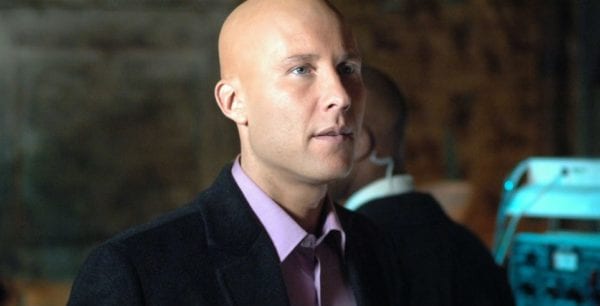As it celebrates its twentieth anniversary, Ricky Church looks back on Smallville…
When I was a young teenager, I had actually been drifting away from comics and superheroes a bit. After Batman & Robin it became clear no more Batman movies were going to be made for a while and cartoons like Batman: The Animated Series, Superman: The Animated Series and Batman Beyond were winding down while the late 90s and early 00s weren’t particularly great for comics. Three things over the course of my high school years reignited my passion for these characters. Starting backwards, it was Batman Begins, Sam Raimi’s Spider-Man films and Smallville.
20 years ago today, one of the longest running science fiction shows aired on television. Smallville set out to explore Superman’s youth in the titular town, but its real objective was to humanize Clark Kent and his journey to becoming the world’s greatest superhero. Over the course of its 10 years, Smallville largely succeeded by placing emphasis on the relationships Clark shared with his family, friends and the people of Smallville and also turned the infamous rivalry between Clark and Lex Luthor into a tragic friendship.
No one expected a show about Superman without actually having Superman to last for so long, but it largely did so because of Clark’s journey. Though Smallville had its ups and downs, season 4 in particular, overall the series was an interesting exploration of Clark’s character and how the people in his life affected his development. Right from ‘Pilot’ to ‘Finale’, there is a strong arc for Clark as he learns how to deal with his powers and matures in ways he could never have expected. There are several episodes that delve deep into his maturity, making his journey into Superman believable.
More than that, though, Smallville succeeded in making Clark Kent relatable. One of the common criticisms found among mainstream audiences is they don’t think an invulnerable alien who can fly and shoot lasers from his eyes can connect with them on an emotional and human level. Smallville accomplished that by following Clark through the most formative years of his life, chronicling his girl troubles, struggle fitting in, adolescence and adjustment to adulthood. Whenever Smallville wanted you to feel the emotion, it often hit you in the face with it too with scenes such as Clark remembering his birth mother Lara in ‘Memoria’, Jonathan Kent’s death in ‘Reckoning’, the first time Clark (or technically Kal-El) flew, or the very first time Clark and Lois admitted they loved each other.
Smallville wasn’t just about Clark’s journey, however. Every hero needs a great villain and though most people point to Batman and Joker as having the greatest rivalry in comics (myself included) Superman and Lex Luthor come to a close second for their similar yin-yang appeal and it was this show that concluded that for me. Though it was something the very early comics of Superboy had introduced, I had never actually given the thought of Lex and Clark being friends in their youth any serious consideration just because of how outlandish it seemed. I mean, could Bruce Wayne and The Joker (whoever he may have been pre-Joker) as best friends? Smallville changed that for me though by portraying Lex as a man trapped in a toxic family, battling against his darker characteristics.
Throughout his time on the show, Michael Rosenbaum really sold the tragedy of Lex. It was an interesting parallel to see Clark rising to superhero status while Lex sunk into darkness. In the early seasons Lex is truly a good person who wants to separate himself from his father’s legacy, looking after his employees well-being and genuinely viewed Clark as the brother he never had. As more was revealed about his troubled childhood and relationship with his father, it was actually a wonder he didn’t turn dark sooner. Smallville took its time building up to his eventual turn to evil, making sure not to rush it and seem a believable change. One of Lex’s ultimate episodes, and Rosenbaum’s finest hours, was ‘Descent’ which saw Lex blossom into full villainy in a very shocking and dark way.
Welling really countered this, showing the growing amount of confidence Clark had in his abilities and desire to help people. His growth from Clark to The Blur to Superman was a great evolution. Of course, the rest of the supporting cast complimented Welling and Rosenbaum’s performances, from John Schneider and Annette O’Toole’s perfect Jonathan and Martha Kent, John Glover’s villainous Lionel Luthor, to Allison Mack’s show created Chloe Sullivan who cultivated a large fanbase of her own, to later additions like Erica Durance as Lois Lane and Justin Hartley as Oliver Queen/Green Arrow, every cast member was perfectly casted and delivered their own takes on these long characters that honoured the legacy of the comics.
Smallville of course had some down turns, like Lana becoming a witch, Jimmy-not-really-Jimmy Olsen’s death, Lana becoming a ‘superhero’ – pretty much anything involving Lana actually, I really hate her character – but I think overall the show’s better qualities far outweighed the negatives. It blossomed from a sci-fi teen show to a full-blown superhero adventure and really explored how Clark’s surroundings and the people in his life that helped him along the way. In the days of the Arrowverse, it’s easy to take for granted Smallville’s status among superhero television, but the reality is that without Smallville we may not have gotten the likes of Arrow, The Flash and Supergirl. Smallville really was a great and intriguing take on the Superman mythos.
SEE ALSO: Smallville: The Top 25 Episodes
Ricky Church













